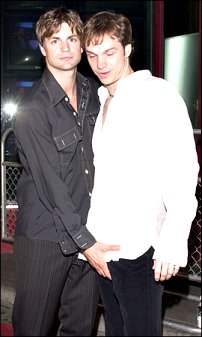News - Feature Stories - Magazine
- Gale Harold
Gale Force
Lipman asked Harold to be at the Showtime offices in Los Angeles
at 8 a.m. on Monday. “He lit up a cigarette, and, very Brianesque, he
said, ‘I’m with this repertory company, and we have to strike a
set on Sunday night, and I don’t think I can make it.’ And we’re
thinking, Is he for real? Who says that? We’ve been in Hollywood too long.
What do you say to that?” Lipman laughs, shaking his head in disbelief.
He pressed a copy of the script into Harold’s arms and asked him to read
it and call them at home the next day.
“I was standing in the kitchen,” Cowen remembers,
“and the phone rang and a voice said, ‘Hi, this is Brian Kinney.’”
 “What
helped me recover,” says Cowen, describing the aftermath of the casting
experience that clearly devastated him both as a filmmaker and as a gay man,
“was that Gale was brave enough to take the part. It was the same way
with Aidan Quinn [who was one of the few actors willing to consider An Early
Frost, in which he starred as a gay man with AIDS]. You need the one actor who
is not afraid and who is very politically committed to what he’s doing.
In a way, that was the emotional salvation.”
“What
helped me recover,” says Cowen, describing the aftermath of the casting
experience that clearly devastated him both as a filmmaker and as a gay man,
“was that Gale was brave enough to take the part. It was the same way
with Aidan Quinn [who was one of the few actors willing to consider An Early
Frost, in which he starred as a gay man with AIDS]. You need the one actor who
is not afraid and who is very politically committed to what he’s doing.
In a way, that was the emotional salvation.”
Harold, it seems, has always been asking questions. He was raised
in the Atlanta suburbs by an engineer father and a mother who sold real estate.
His parents were devout Pentecostals, and his childhood was a classic Southern
mélange of church, school, and sports. “There were so many little
things about my childhood that were Southern,” he says, “and so
many that were suburban American. There was a dairy farm behind my house at
one point.”
Harold manifested an early affinity for soccer, which he calls
“a beautiful game.” As he moved toward adolescence, however, he
began to be concerned about the culture that went along with the game.
“I burned out very rapidly on what you refer to as ‘jocks,’”
he says. “I couldn’t really handle that state of mind. I don’t
know what it’s like to be a girl in team sports, but definitely for a
guy in the States, there are so many flag-waving impulses forced upon you. Excellence
in sports is a good way to keep you moving in the direction of allegiance to
your school and your country.”
Although he didn’t have the terminology at the time, young
Gale observed the homophobia woven into the fabric of his suburban world, both
on the playing fields of Southwest DeKalb High School and in his parents’
church. He is careful not to dwell on the subject of religion out of respect
for his mother, who is still Pentecostal. (His father left the church several
years ago).
“I started to lose all interest [in religion] at around
15, around the time I got my driver’s license,” Harold remembers.
“I knew it was bullshit, you know? The choir director was gay. The assistant
choir director was gay. Most of the men in the choir were gay. It was obvious.
And these were people I talked to and grew up knowing. These were my friends,
and my parents’ friends, and members of the church. And they’re
up there singing and clapping their hands, then they sit down and some ogre
walks up and starts saying something that is basically potentially fatal under
the right circumstances. And we know how fast those circumstances can shift
and become dangerous.
Page 1
. 2 . [3] . 4
. 5 . 6
 “What
helped me recover,” says Cowen, describing the aftermath of the casting
experience that clearly devastated him both as a filmmaker and as a gay man,
“was that Gale was brave enough to take the part. It was the same way
with Aidan Quinn [who was one of the few actors willing to consider An Early
Frost, in which he starred as a gay man with AIDS]. You need the one actor who
is not afraid and who is very politically committed to what he’s doing.
In a way, that was the emotional salvation.”
“What
helped me recover,” says Cowen, describing the aftermath of the casting
experience that clearly devastated him both as a filmmaker and as a gay man,
“was that Gale was brave enough to take the part. It was the same way
with Aidan Quinn [who was one of the few actors willing to consider An Early
Frost, in which he starred as a gay man with AIDS]. You need the one actor who
is not afraid and who is very politically committed to what he’s doing.
In a way, that was the emotional salvation.”